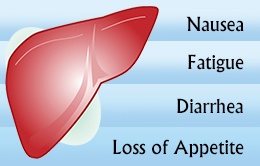
Liver is the largest gland of our body that plays a vital role in storing, absorbing, metabolizing and manufacturing important chemicals in the biological tissues, without which your body would collapse within hours. Some liver diseases are hereditary, while others are acquired over time as a result of poor diet, long term consumption of toxic substances, alcoholism or excessive use of liver damaging drugs. Different types of liver diseases present with different signs, which is why a doctor should be consulted immediately to treat the underlying pathology.
12 Warning Signs of Liver Damage
In most cases, signs of liver damage are evident with moderate involvement of liver tissue. However, often times it has been observed that the signs of liver damage are vague or non- specific which may interfere with the diagnostic or identification process of the liver disease for weeks or even months. Below are a few sign and symptoms that may suggest an ongoing liver illness:
|
Signs & Symptoms |
Description |
|
Skin Color Changes |
A change in skin color is usually an indication of liver damage and is due to significant disruption in the metabolic functions of the liver. The liver is responsible for breaking down the red blood cells into bilirubin. This pigment is then disposed out of the body through feces. When the liver is unable to excrete, the bilirubin accumulates in the body and settles under the skin and eyes. This gives the skin a pale color, a feature particularly characteristic of jaundice. |
|
Abdominal Pain |
The abdominal pain is experienced because of the stretching of liver capsule as a result of glandular enlargement.In addition, as the liver enlarges, it pushes further into the abdominal wall and surrounding viscerato cause pain and discomfort. This symptom is often experienced after moderate involvement of the liver. |
|
Itchy Skin |
When toxins and metabolites accumulate in the body because of the underperformance of liver, most individuals experience rashes and itchiness. This is because toxins irritate the cells and result in the hypersensitivity reaction. |
|
Chronic Tiredness |
As liver dysfunction advances, the patient may experience tiredness, fatigue and lethargy. This is because the liver is the site of intense biological and metabolicactivities that generates energy.With tissue deterioration, the body feels low and energy deprived. |
|
Indigestion |
Liver is involved in fats and glucose metabolism and storage. When liver function starts deteriorating, it loses its ability to produce bile which aids in fats metabolism, or glucose metabolismwhich may present with indigestion and other related issues. |
|
Loss of Appetite |
Liver failure is commonly associated with poor appetite which is one of the most prominent symptoms of poor liver functions. |
|
Frequent Urination |
A change in the color of your piss and alteration in the frequency of micturition is a direct indicator of body’s failure to excrete out unwanted metabolites properly. |
|
Pale Colored Stool |
Bile gives the stool its characteristic color, therefore any alteration in the color or consistency of the stool is a direct indication of liver dysfunction. |
|
Acid Reflux |
Liver is one of the most important organs that play a vital role in the process of digestion. Any liver dysfunction can lead to acid reflux and related issues. |
|
Diarrhea |
Liver is responsible for producing immune modulating proteins. Liver dysfunction or failure is often complimented with infectious diseases. In addition, liver also secretes digestive juices for the digestion of dietary components. Moderate impairment can lead to diarrhea and other issues. |
|
Fluid Retention |
Since your metabolic factoryis unable to excrete out unwanted materials, water retention may also occur due to this toxic effect. Likewise, lack of protein secretion can also lead to edema and swelling of the body, especially extremities, face and intra-adnominal. |
|
General Malaise |
Since the body feels drained and lethargic, it is likely that episodes of headaches and skin disorders will also occur. This may occur because of waste materials circulating the body instead of being excreted out. |
Watch the following video to find more about symptoms associated with liver diseases:
How to Prevent Liver Damage
- Controlled alcohol intake. Individuals over the age of 65 years should limit their intake of alcoholic beverages to one drink per day. Others should also avoid excessive consumption of alcohol.
- Hygiene issues. Using unsterilized needles, having unprotected sex and maintaining an unhygienic lifestyle increase the chances of liver diseases. Care must be exercised when getting intravenous injections and consuming foods from unhealthy sources.
- Vaccinations. Some liver diseases, such as hepatitis, can be prevented through vaccinations.
- Medication regimens. Overuse of drugs can lead to liver damage. Use of NSAIDS for longer time and some highly potent drugs can also induce irreversible liver damage, therefore, drugs should be used as prescribed and regular liver function tests should be conducted when chronic use is required.
- Blood exchange. Hepatitis infection can be transmitted from one person to another via transfer of their body secretionsby accident or intentionally.
- Using aerosol sprays. When using insecticides or pesticides, proper directions must be followed to ensure that the toxins do not enter the biological system and cause organ damage. In addition, use gloves to protect the skin from direct contact.
- Weight maintenance. Obesity can lead to excessive fat accumulation in liver that might disrupt liver function and its ability to metabolize fats.
How Can Liver Damage Be Treated?
Liver damage can be treated with medicationand life style changes mainly, but in some cases surgery and transplants may be necessitated. The treatment regimen and method depend on the nature and severity of the damage itself.In case any anomalous signs and symptoms are experienced, visit a doctor immediatelyto catch the disease in its early stage. Also, annual tests should be made habitual in order to keep a tab on your physical health.